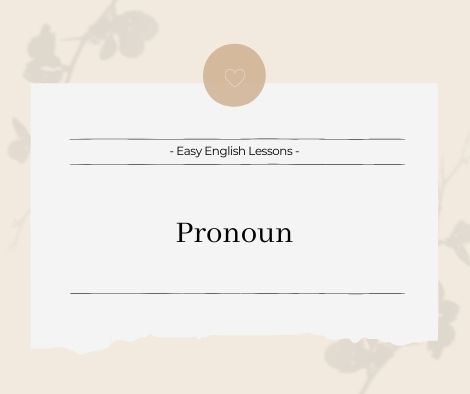Pronoun หรือ คำสรรพนาม
คำสรรพนาม คือ คำที่ใช้แทนคำนาม เพื่อจะได้ไม่ต้องกล่าวถึงคำนามนั้นซ้ำไปซ้ำมา
- Joe lives in Alaska. Joe works in a restaurant.
- Joe lives in Alaska. He works in a restaurant.
Personal Pronoun
คือ สรรพนามที่ใช้แทน คน สัตว์ สิ่งของ สถานที่ ซึ่งมีทั้งสรรพนามที่ใช้เป็นประธานของประโยค (Subject Pronoun) และสรรพนามที่ใช้เป็นกรรมของประโยค (Object Pronoun)
- Subject Pronoun สรรพนามที่ใช้เป็นประธานของประโยค ได้แก่ I, you, we, they, he, she, it
ตัวอย่าง
I really love cats.
You have to go to work.
We go to school by bus.
They bought a new car last week.
He likes dogs.
She is very pretty.
It was amazing.
- Object Pronoun สรรพามที่ใช้เป็นกรรมของประโยค ได้แก่ me, you, us, them, him, her, it
ตัวอย่าง
My mum hugged me.
I love you.
He teaches us English.
I want to see them again.
Jane invited him to the party.
I give her my money.
I don’t like it.
Processive Pronoun
คือสรรพพนามที่ใช้แสดงความเป็นเจ้าของ ได้แก่ mine, yours, ours, theirs, his, hers, its
ตัวอย่าง
This book is mine.
My opinion differs from yours.
Your house is bigger than ours.
The ship is theirs.
My car was parked behind his.
The wallet is hers
The dog went to its house.
Reflexive Pronoun
คือสรรพนามที่บอกถึงการกระทำด้วยตัวเอง หรือแสดงว่าผู้กระทำเป็นผู้รับผลของการกระทำนั้นด้วยตัวเอง (หรือ Reflects back to the subject) ได้แก่ myself, yourself, himself, herself, itself, ourselves, themselves, yourselves (พหูพจน์),
ตัวอย่าง
I made it myself.
Do it yourself.
Nick introduced himself.
Mary stopped herself from crying.
The cat is licking itself.
We enjoyed ourselves at the party.
They agreed among themselves.
Did you do it yourselves?
Interrogative Pronoun
คือสรรพนามที่ใช้เป็นคำถาม (to ask questions) ได้แก่ what, which, who, whom, whose
ตัวอย่าง
What is this?
What is that?
What time is it?
What did you eat today?
Which one is yours?
Which museums did you visit?
Who wants to go hiking this weekend?
Who is that?
Who are you talking to?
Whom are you giving that gift for?
Whom is that dog chasing?
Whom did you choose for your class leader?
Whose car is the black one?
Whose shoes are these?
Whose car was stolen last night?
Demonstrative Pronoun
คือสรรพนามที่ใช้บ่งชี้ว่า คนไหน อันไหน สิ่งไหน (show or point to objects or people)
ได้แก่ this, that, these, those
This และ That ใช้กับนามเอกพจน์
- This ใช้กับนามที่อยู่ใกล้ (nearby)
- That ใช้กับนามที่อยู่ไกลออกไป (far away)
These และ Those ใช้กับนามพหูพจน์
- These ใช้กับนามที่อยู่ใกล้ (nearby)
- Those ใช้กับนามที่อยู่ไกลออกไป (far away)
ตัวอย่าง
This is an apple.
That is an orange.
This is a cat.
That is a dog.
These are apples.
Those are oranges.
These are cats.
Those are dogs.
This is my house.
That is my mum’s house.
These are amazing candies.
Relative Pronoun
คือ สรรพนามที่ใช้แทนนามที่อยู่ข้างหน้า เพื่อเชื่อมความสัมพันธ์ระหว่างนามและส่วนขยายที่ตามมา (show a relationship between a noun and a clause)
ได้แก่ that, which, who, whom, whose, where, when
ตัวอย่าง
It is the train that goes to Chiangmai.
Ice cream, which is my favorite dessert, is now available at the store.
The girl who came here yesterday is my sister.
The man whom you saw last night is my best friend.
Whose bicycle did you want to borrow?
Please sign your name on the form where I’ve put the cross.
The day when the event took place was Sunday.
Indefinite Pronoun
คือ สรรพนามที่แทนนามทั่วไปโดยไม่เฉพาะเจาะจง (not refer to a specific person or thing)
ได้แก่ some, any, none, all, someone, something, somebody, anybody, anything anyone, few, everyone, everything, many, nobody, other, others, another, one, each, either, neither
ตัวอย่าง
Some are better than others.
Anything is possible.
Either one should be fine.
Everything is going as planned.
Someone knows where he is.
No one believes you.
